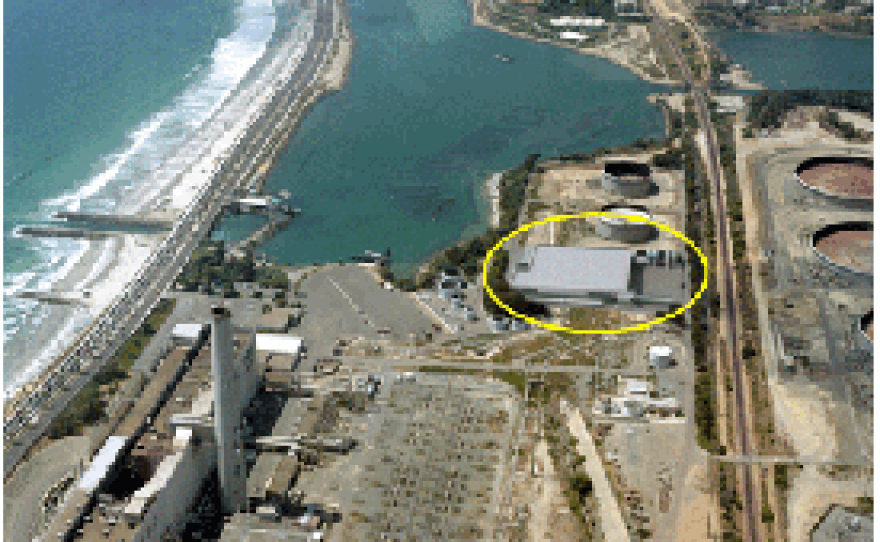(Photo: The Carlsbad Desalination Project would consist of a 50 million gallon per day (56,000 acre-feet per year (AFY) seawater desalination plant and associated water delivery pipelines. Posiedon Resources )
The State Lands Commission today considers granting a lease of state property to a company that wants to build a desalination plant in Carlsbad. It's one of the last regulatory hurdles the project must clear before construction could start. KPBS Environmental Reporter Ed Joyce has more.
The state coastal commission approved a construction permit earlier this month for Posiedon Resources to build the desalination plant. Now the company needs a lease to use state land for the project, which would be built at the site of the Encina Power Station.
The State Lands Commission will decide whether the desalination plant will hurt public resources - especially the local marine habitat.
Lt. Governor John Garamendi is one of the land commissioners making that decision. He says whether the plant adds to global warming is one of the issues under consideration.
Garamendi: Is this project carbon-neutral or is it simply going to be be an additional carbon burden on our atmosphere. The information that was presented at the coastal commission hearing seemed to be that they had figured out how to make the project carbon-neutral. We have not, at the state lands commission, had a chance to review that information.
He says the lands commission will evaluate whether Poseidon is doing enough to offset damage the project will cause to the marine ecosystem.
Garamendi: Again this issue was addressed at the coastal commission meeting in a way that was satisfactory to the coastal commission. At the state lands commission we will review what was learned by the coastal commission and we'll make our own independent judgement on the mitigation.
Poseidon's Scott Maloni says the company's plan is sufficient under the law.
Maloni: We've offered up a mitigation plan that fully, fully restores and maintains and preserves the coastal wetlands which is what our obligation is under the coastal act.
Mark Massara, the director of Coastal Programs for the Sierra Club, says the desal plant will destroy millions of fish and do long term damage to coastal fisheries while generating greenhouse gas emissions. He's says Poseidon's plan falls short.
Massara: Poseidon wants the alternative of walking away from these climate-change promises. They're going around telling everyone as a part of their PR program, that they're going to be carbon-neutral, they're going to be unprecedented, uniquely progressive and that they're going to offset greenhouse gases100 percent. Well, the reality is something much different.
Poseidon has proposed restoring up to 50 acres of marine wetlands to offset damage the desal plant will do to marine life.
But Massara says it’s premature to limit future restoration to a certain number of acres.
Massara: They simply want to put a cap on their future obligations for environmental protection and restoration when in fact we don't even know what the damages are going to be yet.
He says 300 acres of restoration is necessary for both wetlands and rocky reef habitat to offset damage to marine life. But if the land lease is approved today, the project still has to get a final permit from the Regional Water Quality Control Board.
And while the regulatory approval process may be winding down, the legal challenges are just beginning.
Surfrider Foundation has filed a lawsuit challenging the coastal commission's approval of the project.
Surfrider Attorney Angela Howe says the coastal commission's approval is an illegal application of the Coastal Act and other laws protecting the state's coastline and ocean.
While the state considers allowing a desalination plant in San Diego County, Orange County already has a major recycling plant in place.
Garamendi says that may be the better choice for San Diego.
Garamendi: The recycling in many ways is a much more viable alternative than seawater. You don't have many of the issues and you do not have the same contaminants in the water that you do with seawater.
Poseidon's Scott Maloni says if the company gets the necessary approvals, it could break ground next year and turn seawater into 50 million gallons of fresh water in 2011.
Ed Joyce, KPBS News.






